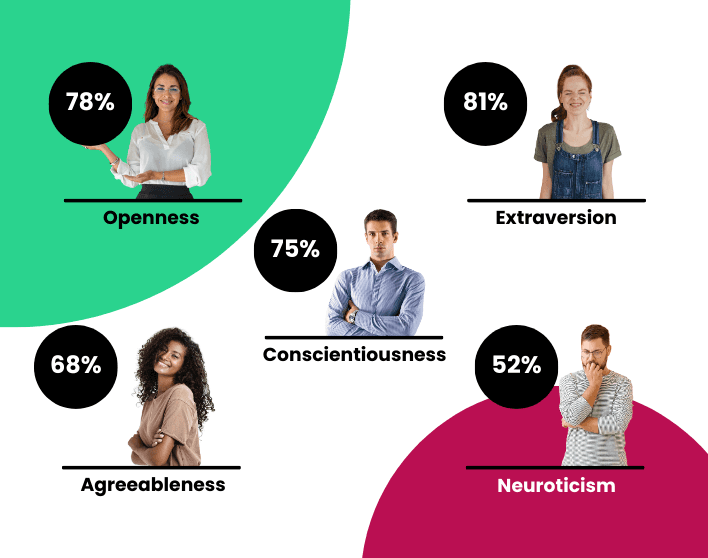Veronika Bougioukli
I-O Psychologist
"What is the core purpose of our existence as a company?”
This seemingly rhetorical question often whispered in boardrooms and echoed in strategic meetings, transcends the surface of corporate inquiry. It is, in fact, the heartbeat of organizational identity; a question that all organizations should answer to define their essence.
As financial organizations, in particular, strive to define their purpose and navigate the complex business landscape, the concept of culture, and by extension, culture fit, emerges as a guiding force. Culture fit in the workplace refers to the alignment between an individual's values, beliefs, and working style and the core principles of an organization. It transcends beyond compatibility and delves into the shared narrative that binds individuals within an organizational framework.
In the words of the Harvard Business Review (2013), "Culture is a carrier of meaning. Cultures provide not only a shared view of 'what is' but also of 'why is.' In this view, culture is about 'the story' in which people in the organization are embedded, and the values and rituals that reinforce that narrative."
This evolving perspective on organizational culture highlights its dynamic role within the finance sector, illustrating how it actively molds financial institutions' identity and strategic aims. As we navigate the intricate aspects of culture and culture fit, we underscore their critical importance in steering financial organizations toward their objectives. Culture acts as a beacon, drawing in and retaining individuals whose values and vision align with the company's, enriching the collective journey toward innovation and resilience in the ever-changing financial landscape.
Revealing the Essence of Culture and the Power of Fit
Culture, a term often heard and vaguely understood, carries a certain charm in the realm of organizations. We've all encountered it, felt its presence, and may even think we know what it entails. However, what truly defines organizational culture remains an enigma, a concept that goes beyond the superficial. Let's delve into the essence of what organizational culture really is.
Organizational culture is the invisible force that breathes life into a company's structure and strategy. It can be defined as a robust tapestry of shared beliefs and values intricately woven into the fabric of an organization. These values are not static; they evolve, shaping and being shaped by the collective experiences and aspirations of the workforce.
The components of organizational culture are akin to the building blocks of identity. They encompass the beliefs, customs, rituals, and shared assumptions that guide the behavior of individuals within the organization. This living culture is not confined to the pages of a manual but is vividly alive in the day-to-day interactions, decision-making processes, and the overall atmosphere within the workplace
To that end, discovering individuals capable of upholding and promoting the foundational components of organizational culture becomes paramount. This is where culture fit comes into play. Culture fit is the magnetic force that aligns individual values and beliefs with the overarching principles of the organization. A powerful synergy is born when harmony between an individual's intrinsic motivations and the values the organization upholds. This alignment is not just about ticking off a checklist; it's about shared purpose and a collective understanding of the 'why' behind the 'what.'
Organizational values are not mere statements on a wall but guiding lights illuminating the path toward achieving strategic goals. Culture fit ensures that these values are aspirational and actively embraced and practiced by each organization member. This alignment becomes the driving force that propels the company towards actualizing its mission, fostering a sense of unity and purpose.
In essence, culture fit is not just a checkbox in the organizational processes or a nice-to-have component; it's a strategic investment in the success and well-being of the individual and the organization. Exploring the symbiotic relationship between culture fit and organizational dynamics reveals a powerful formula for creating a workplace where everyone thrives.

Beyond Nice-to-Have to Must-Have
Having deciphered the essence of organizational culture and the transformative power of culture fit, the question arises: what tangible benefits emerge from fostering these connections within the workplace? Moving beyond the conceptual, we now explore the concrete advantages that materialize when culture and individual values align- from improved teamwork to a strong organizational brand.
Let's explore these advantages one by one.
Improved Teamwork and Collaboration
Cultural alignment promotes a sense of unity and shared values among team members. This shared understanding of the company's mission, vision, and core values creates a cohesive work environment where individuals are more likely to collaborate seamlessly. Team members identifying with the organizational culture are better equipped to communicate effectively, understand each other's perspectives, and work towards common objectives.
Furthermore, a culture that encourages open communication and mutual respect enhances the overall collaboration experience. Employees who feel a cultural connection are likelier to share ideas, provide constructive feedback, and actively contribute to team discussions. This synergy not only leads to the generation of innovative solutions but also fosters a positive and inclusive team culture.
In addition, a culturally aligned workforce tends to exhibit higher levels of trust. When individuals feel a sense of belonging and shared identity, they are more inclined to support one another, leading to a more resilient and cooperative team.
Elevated Employee Engagement and Satisfaction
The significance of a strong culture fit between employees and the company cannot be overstated when considering the impact on employee engagement and satisfaction. When employees resonate with the company's values, mission, and ethos, a ripple effect of positive outcomes is set in motion. Numerous studies have consistently demonstrated a direct correlation between strong employee engagement and favorable factors.
One notable benefit is the substantial increase in overall employee satisfaction. Individuals who feel a cultural connection with their workplace are more likely to find fulfillment in their roles, resulting in higher job satisfaction. Moreover, a culture fit contributes to heightened commitment among employees. When individuals align with the organization's values and objectives, they are more inclined to invest in their roles, actively contributing to the company's success. This heightened commitment fosters a positive work environment and translates into improved performance across various organizational levels.
Engaged employees are shown to positively influence a company's financial profitability. Their dedication and motivation increase productivity, efficiency, and innovation, ultimately contributing to the organization's bottom line. In addition, cultural alignment plays a pivotal role in enhancing managerial effectiveness. Leaders who understand and promote the organization's culture create a work environment that encourages open communication, trust, and collaboration.
Increased Employee Motivation and Productivity
Elevating employee motivation and productivity is a direct outcome of a well-aligned organizational culture. Studies have consistently shown that employees who feel connected to their company's values and culture are more motivated, resulting in increased productivity.
The findings from the Gallup survey underscore this correlation, revealing that employees deeply connected to their company's culture are 2.7 times more likely to bear responsibility for the quality of the products or services. He underlines the financial implications of motivating employees for a company's success. The positive correlation between employee motivation and productivity extends beyond individual tasks; it permeates the overall work atmosphere, fostering a dynamic and energized environment.
A culture fit provides a sense of purpose and direction and cultivates a shared enthusiasm for achieving organizational objectives. This enthusiasm translates into a willing and eager workforce that goes the extra mile. A well-crafted organizational culture serves as a powerful motivator, unlocking employees' full potential and fostering a productive, high-achieving work environment.
Boosted Reputation and Brand
Building a culture that resonates with employees enhances internal dynamics and reverberates externally, contributing to a positive impact on organizational reputation and brand. A compelling organizational culture becomes a magnet for top talent, influencing how employees and the wider public perceive the company.
As highlighted by Gallup in 2018, creating a culture that attracts star talent can result in a remarkable 33% higher revenue. This statistic underscores the direct correlation between a strong organizational culture and financial success, emphasizing culture's pivotal role in shaping a company's external perception.
Organizations with a well-defined and appealing culture are often regarded as employers of choice, drawing in top-tier professionals who align with the company's values. This, in turn, contributes to establishing a positive brand image as talented individuals become ambassadors for the organization.
Moreover, a positive organizational reputation extends beyond attracting talent; it influences how clients, customers, and partners perceive the company. A strong and positive brand image enhances customer loyalty, trust, and overall satisfaction, ultimately contributing to sustained business success.
In essence, the positive impact of organizational culture on reputation and brand is not just an internal affair but a strategic move that ripples through various facets of the business.
Cultural Dynamics in the Finance Industry
Having established the significance of culture and its role in fostering organizational success, it becomes evident that these principles hold universal importance across industries. However, each sector possesses unique characteristics and challenges, shaping the specific nuances of its cultural landscape. Among these industries, the finance sector stands out as a pivotal domain where the role of culture is particularly pronounced.
Within the financial services realm, a whirlwind of change is underway. Automation, digital technology innovations, the rise of new currencies, and a volatile, constantly evolving environment characterize the present landscape. Amidst these shifts, risks loom large, prompting increased attention from regulators and investors on the shaping, embedding, and managing culture within financial organizations. Recognized as pivotal to facilitating dynamic responses and ensuring long-term success, culture emerges as a linchpin for navigating the complexities of the modern financial arena. Financial services entities must cultivate a robust culture. One that not only withstands the pressures of change but also propels organizations toward resilience and adaptability.
Within this evolving milieu, several key focus areas are reshaping the cultural dynamics within financial organizations. At the forefront lies leadership influence, where the tone set by top executives plays a pivotal role in shaping, communicating, and challenging the firm's culture. Their actions and words reverberate throughout the organization, shaping its collective values and behaviors.
Equally vital is cultivating a culture that prioritizes good governance and controls. This involves fostering integrity, transparency, and accountability at all organizational levels to safeguard against risks and ensure compliance with regulatory standards. Reinforcing behaviors aligned with the firm's values fosters cohesive action and decision-making while aligning purpose, strategy, and culture empowers employees to pursue common goals collaboratively.
Enhanced individual accountability fosters a culture of ownership and excellence, driving performance and results. Remuneration and incentives play a crucial role in shaping behaviors and outcomes within financial organizations, serving as powerful motivators when designed to promote positive outcomes for the firm, customers, and the market.
Furthermore, embracing diversity and inclusion is paramount for fostering innovation and adaptability by welcoming various perspectives and ideas. Beyond demographic representation, diversity of thought enriches organizational culture, fostering creativity and ensuring resilience in a rapidly changing environment. (Deloitte, 2019)
Futureproofing Finance for Sustainable Success
In wrapping up our exploration of culture's pivotal role in the finance industry's success, it's clear that culture isn't just a buzzword—it's the bedrock of organizational prosperity. From understanding culture adherence to actively shaping it, we've uncovered the transformative power of proactive cultural management.
Using a solution like Bryq provides deep insights into culture adherence and fit, enabling more informed decision-making to enhance your work environment. This approach reduces reliance on guesswork, offering precise understanding and strategies for cultivating a robust organizational culture. Such a foundation is crucial for navigating and flourishing within the dynamic finance industry.
Want to read more of Bryq’s dedicated insights for the Finance sector? Read our whitepaper.
References
Harvard Business Review, 2013 What Is Organizational Culture? And Why Should We Care?
Gallup, 2023 To Drive Customer Retention, Don't Neglect Culture
Gallup, 2018 Culture Wins By Getting the Most Out of People
KPMG April 2021. Organizational Culture in the Financial Services Sector, What's Now and What's Next
Deloitte 2019, Culture in financial services









